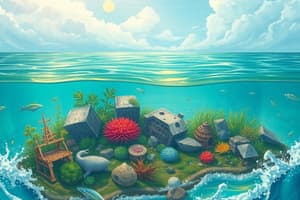Podcast
Questions and Answers
Why do scientists measure sea surface temperature?
Why do scientists measure sea surface temperature?
Scientists measure sea surface temperature to understand how the ocean communicates with Earth's atmosphere, to provide fundamental information on the global climate system, for weather prediction and atmospheric model simulations, and for the study of marine ecosystems.
What are the benefits of SST measurements?
What are the benefits of SST measurements?
SST measurements benefit climate and seasonal monitoring/forecasting, military defense operations, validation of atmospheric models, sea turtle tracking, evaluation of coral bleaching, tourism, and commercial fisheries management.
How do El Niño and La Niña cycles affect ocean circulation and weather patterns?
How do El Niño and La Niña cycles affect ocean circulation and weather patterns?
El Niño and La Niña cycles, caused by multiyear shifts in pressure and wind speeds, affect ocean circulation, global weather patterns, and marine ecosystems. During El Niño, temperatures in the Pacific near the equator are warmer than normal, and during La Niña, the same area experiences colder than normal ocean temperatures.
What are the different methods used by scientists to measure SST?
What are the different methods used by scientists to measure SST?
Why is SST data especially useful for identifying the onset of El Niño and La Niña cycles?
Why is SST data especially useful for identifying the onset of El Niño and La Niña cycles?
Flashcards are hidden until you start studying




